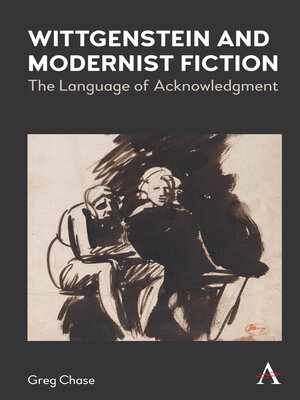Wittgenstein and Modernist Fiction
ebook ∣ The Language of Acknowledgment · Anthem Studies in Wittgenstein
By Greg Chase

Sign up to save your library
With an OverDrive account, you can save your favorite libraries for at-a-glance information about availability. Find out more about OverDrive accounts.
Find this title in Libby, the library reading app by OverDrive.



Search for a digital library with this title
Title found at these libraries:
| Library Name | Distance |
|---|---|
| Loading... |
The early decades of the twentieth century were a period of major economic and cultural upheaval across Europe and America. Scholars have typically held that novelists responded to these shifts by questioning language's capacity to picture the world accurately. But, even as modernist novels move away from a view of language as a means of gaining knowledge, they also underscore its capacity to grant acknowledgment; they treat words as tools for recognizing and responding to the inner lives of others. This book brings out this crucial feature of modernism by engaging with the philosophy of Ludwig Wittgenstein and with Stanley Cavell's pioneering interpretation of Wittgenstein's thought. The book shows how Wittgenstein's interest in acknowledgment emerges over the course of his career-long effort to grapple with the same disorienting conditions of modern life that the experimental fiction of this period registers, including world wars, industrialization, and new conceptions of sexuality. It, then, argues that modernist novels by E.M. Forster, Virginia Woolf, Nella Larsen, William Faulkner, and others exhibit a similar interest in language's capacity to grant acknowledgment. These novels offer readers a way of hearing what Wittgenstein calls "the silent soliloquy of others," giving us words by which we might acknowledge the otherwise unvoiced inner lives of socially marginalized figures.
|Wittgenstein and Modernist Fiction: The Language of Acknowledgment shows how early twentieth-century economic and social upheaval prompted new ways of conceptualizing the purposes and powers of language. Scholars have long held that formally experimental novels written in the early twentieth century reflect how the period's material crises—from world wars to the spread of industrial capitalism—call into question the capacity of language to picture the world accurately. This book argues that this standard scholarly narrative tells only a partial story. Even as signal modernist works by Virginia Woolf, Nella Larsen, William Faulkner, and others move away from a view of language as a means of gaining knowledge, they also underscore its capacity to grant acknowledgment. They show how language might matter less as a medium for representing reality than as a tool for recognizing others.
The book develops this claim by engaging with the philosophy of Ludwig Wittgenstein. Writing in 1945, in the preface to Philosophical Investigations, Wittgenstein laments, "It is not impossible that it should fall to the lot of this work, in its poverty and in the darkness of this time, to bring light into one brain or another—but, of course, it is not likely." Worrying that "the darkness" of this historical moment renders his words unintelligible, Wittgenstein echoes the linguistic skepticism that scholars have found in literary modernism. But the Investigations ultimately pushes back against such skeptical doubts by offering a vision of language as a set of shared human practices. Even when it comes to a word like "pain," which seemingly gestures toward something absolutely private and individual, Wittgenstein indicates that we learn what "pain" means by familiarizing ourselves with the contexts in which people use the term. In his pioneering reading of the Investigations as a "modernist" work, Stanley Cavell argues that Wittgenstein's distinctive response to the problem of skepticism consists in the view that "other minds [are] not to be known, but acknowledged."
The book argues that this concept of acknowledgment, as articulated implicitly by Wittgenstein and explicitly by Cavell, enables a broader reconceptualization of modernist fiction's stance toward the referential...







